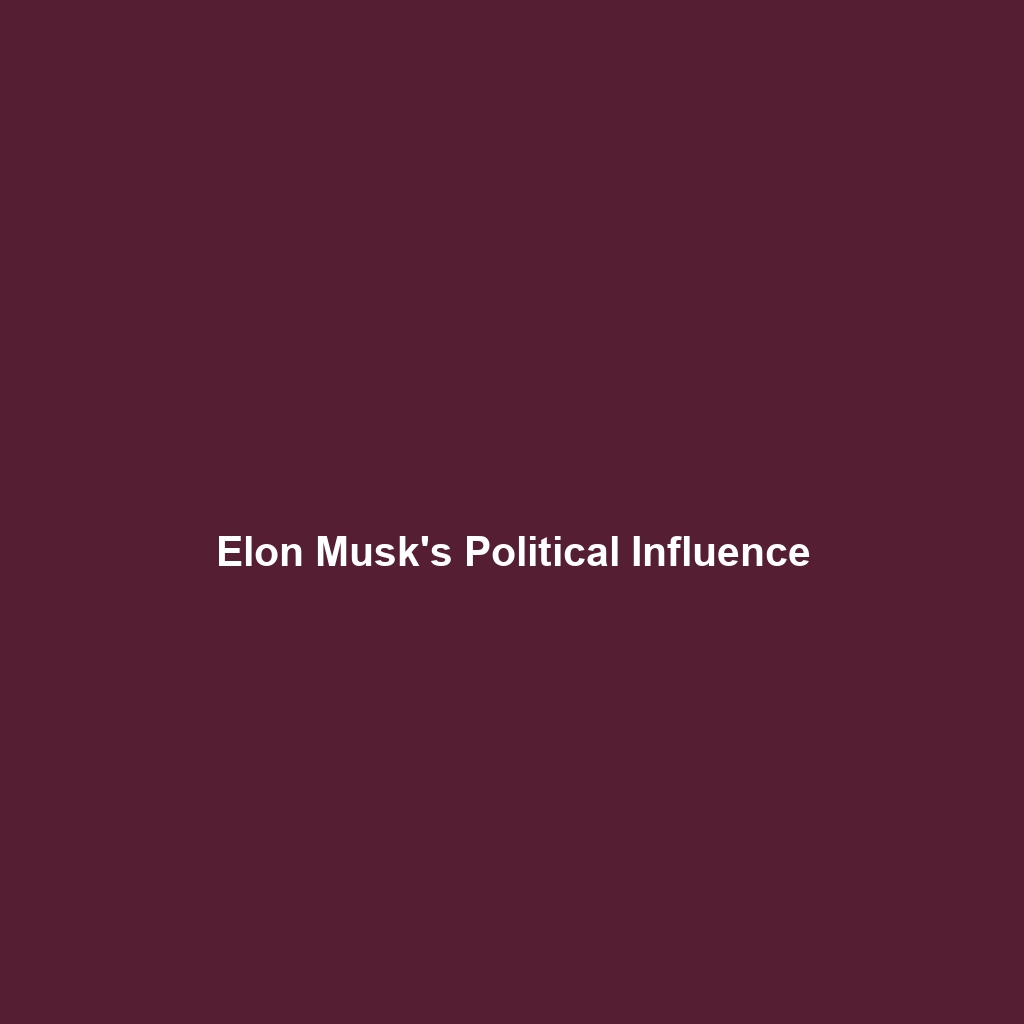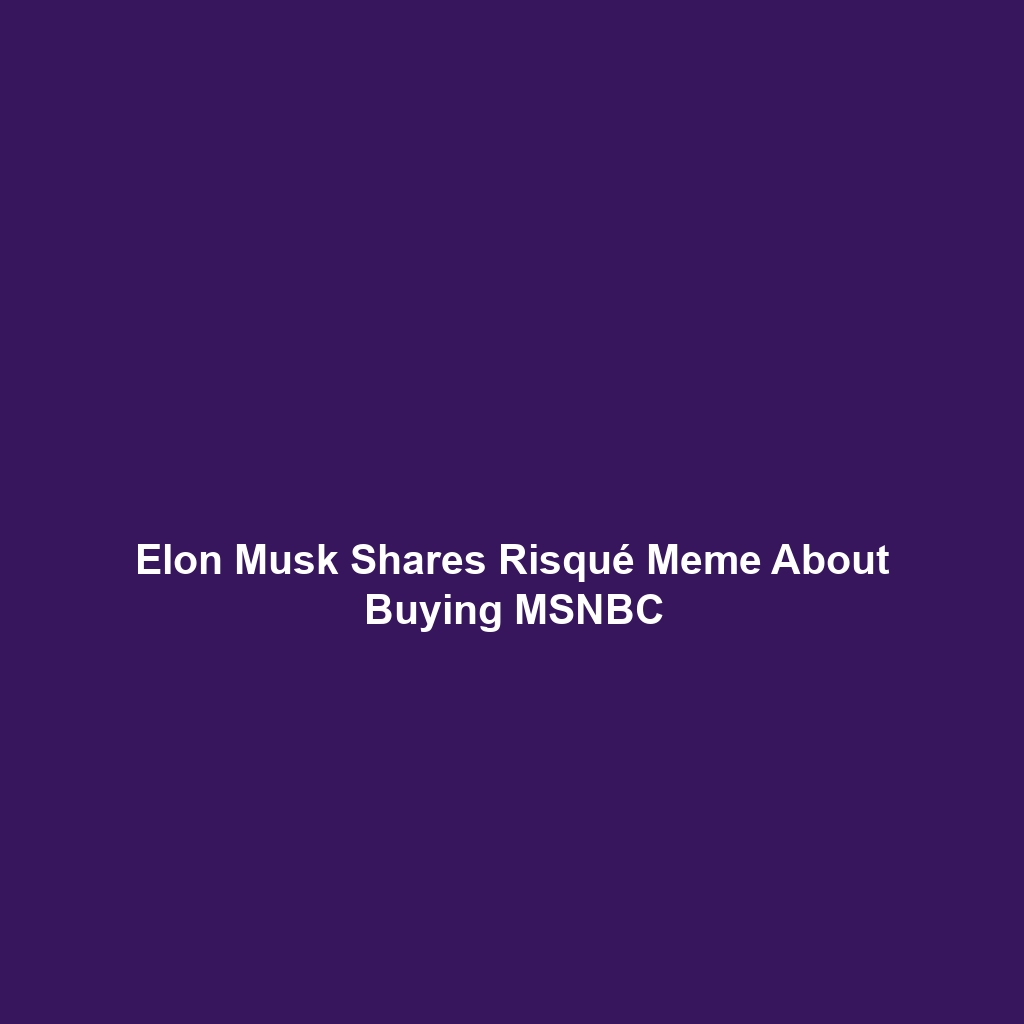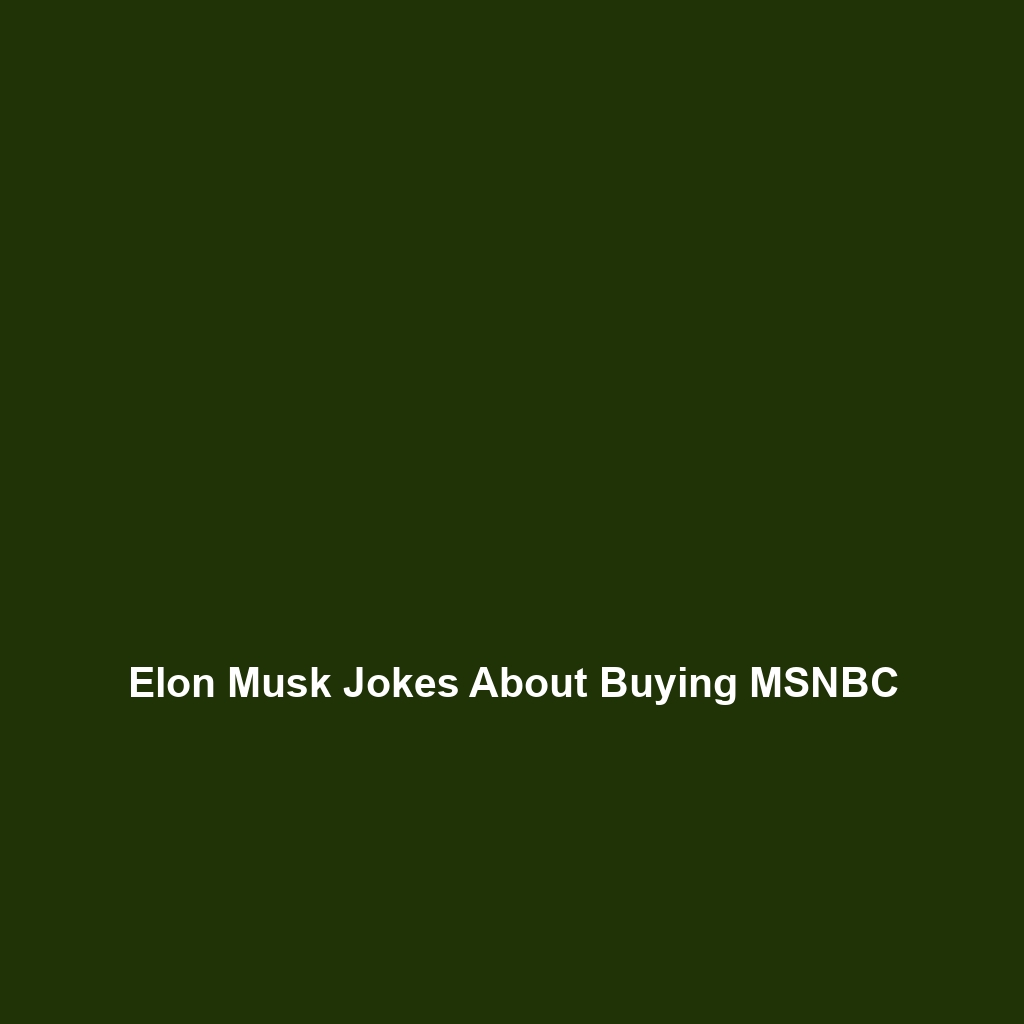Your cart is currently empty!
Tag: Elon Musk
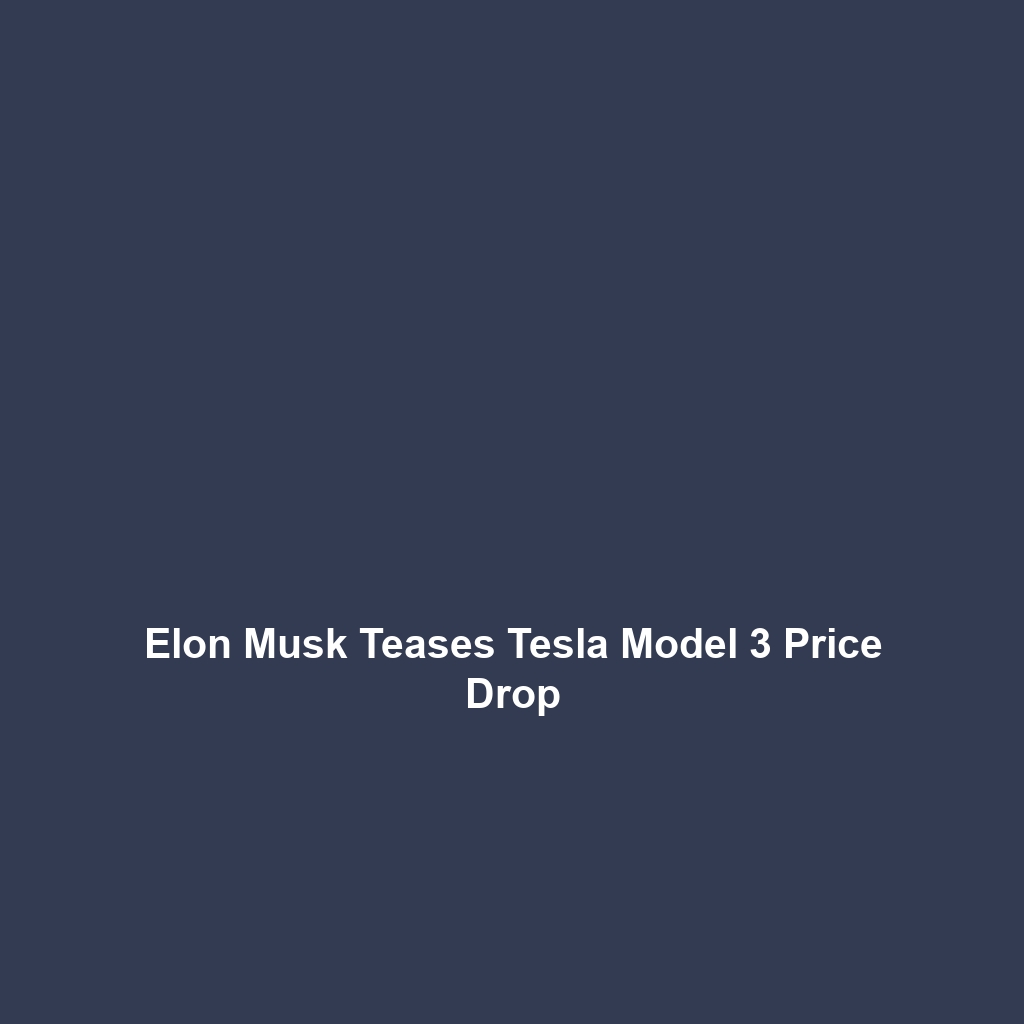
Elon Musk Teases Tesla Model 3 Price Drop
Elon Musk Teases Tesla Model 3 Price Drop
Elon Musk Teases Tesla Model 3 Price Drop
In a recent statement, Tesla CEO Elon Musk hinted at a potential price reduction for the popular Model 3 electric vehicle (EV) in 2024. This announcement comes as Tesla aims to enhance the affordability of its vehicles amid increasing competition in the EV market.
Musk’s Statement on Pricing
During a quarterly earnings call on October 24, 2023, Musk indicated that the company is considering reducing the price of the Model 3 to broaden its customer base and make electric vehicles more accessible. “We want to accelerate the world’s transition to sustainable energy, and making our cars affordable is a crucial part of that,” Musk stated, emphasizing the importance of affordability in reaching new consumers.
The Current Market Landscape
Currently, the starting price for the Model 3 is around $40,000, making it one of the more moderately priced EVs in the market. As competitors, including Ford, Volkswagen, and Rivian, continue to launch their own affordable electric models, Tesla faces pressure to maintain its market share. Analysts suggest that a price adjustment could help Tesla remain competitive as more consumers seek electric alternatives.
Factors Influencing the Price Drop
Several factors may contribute to Tesla’s decision to lower the Model 3’s price. According to industry experts, reductions in battery costs have improved Tesla’s margins, allowing the company greater flexibility in pricing. Additionally, the introduction of new manufacturing technologies and economies of scale may support a price cut.
Dr. John M. Fenton, an automotive industry analyst, notes, “With the ongoing advancements in battery technology and electric powertrains, it’s feasible for Tesla to lower prices while keeping their profit margins intact.” He further elaborates that such a strategy is not just about staying competitive but also about driving widespread EV adoption.
Impact on Tesla’s Financials
Potential price reductions could have various implications for Tesla’s financial performance. While lower prices may initially reduce revenue per vehicle, increased sales volumes could offset this decline. Tesla has historically relied on high-margin vehicles, such as the Model S and Model X; however, the bulk of its sales come from the Model 3. Thus, a strategic move to lower its price could be a beneficial long-term approach.
“If Tesla can boost sales of the Model 3 significantly, the increase in volume will help stabilize their revenue streams,” said Emily Chen, an automotive market researcher.
Consumer Sentiment and Expectations
Consumer sentiment appears to be aligning with Musk’s vision. Surveys indicate that price remains a key consideration for many prospective EV buyers. According to a recent poll conducted by Consumer Reports, nearly 60% of respondents stated that they would consider purchasing an electric car if prices were more in line with traditional gasoline vehicles.
Moreover, Tesla’s reputation for innovation and quality, coupled with a price drop, could significantly influence purchasing decisions. A decrease in the Model 3’s price could further enhance its appeal, particularly among first-time EV buyers.
The Broader Electric Vehicle Market
Tesla’s potential price drop could also have ripple effects across the broader electric vehicle market. Other manufacturers may feel compelled to adjust their pricing strategies in response to Tesla’s moves, thereby setting off a trend toward lower prices in the electric vehicle segment.
Automakers such as Nissan and Chevrolet are also evaluating their strategies to match Tesla’s market traction. According to market analysts, this increased competition could further benefit consumers through more choices and lower prices overall.
Looking Ahead: What This Means for Tesla and Consumers
Looking forward, the potential price drop of the Tesla Model 3 symbolizes a strategic shift toward greater accessibility and consumer reach. If implemented effectively, this could not only solidify Tesla’s position as a market leader but also hasten the transition to electric mobility.
The anticipated Model 3 price reduction aligns with broader industry trends toward more affordable electric vehicles, promising an exciting era for both Tesla and its customers. Consumers eager for affordable EV options may soon find the Model 3 to be a more enticing choice.
Conclusion
Elon Musk’s hints at a potential price cut for the Tesla Model 3 underscore the company’s ongoing commitment to accessibility in the electric vehicle market. With increasing competitive pressure and prevalent consumer demand for affordable EVs, a price drop could significantly benefit both Tesla’s market position and the overall growth of sustainable transportation.
As the automotive industry adapts to the changing landscape of consumer expectations and technological advancements, Tesla’s moves will likely be closely monitored by analysts, competitors, and consumers alike.

Elon Musk Partners with SpaceX Rivals
Elon Musk Partners with SpaceX Rivals
Elon Musk Partners with SpaceX Rivals
In a groundbreaking move towards revolutionizing the space industry, Elon Musk’s SpaceX is entering into collaborations with several emerging aerospace startups. This partnership aims to significantly reduce the costs associated with satellite deployment, marking a pivotal moment in a highly competitive sector.
Strategic Partnerships for Cost Reduction
The partnerships, reported by SpaceNews, focus on leveraging the technological innovations and entrepreneurial spirit of various startups to drive down launch costs. SpaceX, known for its ambitious goals and groundbreaking work in reusable rocket technology, is now looking to augment its capabilities by collaborating with those that have proven themselves in niche segments of the aerospace sector.
Among the startups involved is Rocket Lab, which has emerged as a notable player in the small satellite launch market. Their Electron rocket has gained traction for its reliability and lower-cost offerings in launching small payloads to orbit. Musk’s interest in such ventures stems from an overarching goal to make space more accessible and affordable for smaller companies and governmental organizations that cannot afford traditional launch prices.
Critical Context: The Competitive Landscape
The aerospace industry has witnessed rapid developments over the past decade, with the entrance of numerous companies striving to carve out their niches. Blue Origin, founded by Jeff Bezos, is one of SpaceX’s most significant rivals. As competition intensifies, the need for cost-effective satellite deployment solutions becomes increasingly crucial.
Analysts suggest that SpaceX’s collaboration with aerospace startups could play a strategic role in maintaining its competitive edge. “Elon Musk understands that the future of space exploration and commercialization leans heavily on affordability and innovation. Partnering with startups could provide both,” comments Dr. Sarah L. Smith, an aerospace industry analyst at Aerospace News.
Technological Innovations at Play
The ongoing collaboration focuses on utilizing advanced technologies such as artificial intelligence and machine learning to optimize designs and manufacturing processes. These innovations are expected to enhance the efficiency and cost-effectiveness of launch systems. Startups participating in this initiative are exploring lightweight materials and innovative propulsion systems that could further reduce launch expenses.
For instance, Planet Labs, known for its fleet of Earth-imaging satellites, is exploring partnerships with SpaceX to streamline its satellite launches. By negotiating shared launch opportunities, both organizations can benefit from reduced costs, enabling Planet Labs to expand its operations significantly.
Environmental Considerations and Sustainability
As the aerospace sector evolves, environmental concerns regarding rocket launches have prompted many companies, including SpaceX, to prioritize sustainability. The collaboration with aerospace startups includes a strong focus on developing eco-friendly launch options.
According to Keith Cowing, editor of NasaWatch, “As competition heats up, the expectation for companies to incorporate sustainable methods into their operations is becoming a standard. SpaceX’s initiative to partner with startups aligns with this growing trend.” The shift towards greener technology will not only mitigate environmental impact but could also reduce operational costs in the long run.
Future Implications: A New Era for Satellite Deployment
The implications of these partnerships are substantial for both SpaceX and its affiliated startups. As traditional aerospace giants face increased pressure from new entrants, collaborations like these could reshape market dynamics. Smaller firms may find new avenues for growth by tapping into the resources and expertise of a leading company like SpaceX.
Furthermore, as technological advancements continue to unfold, the landscape of satellite deployment stands at the brink of a major transformation. Companies that embrace collaboration rather than competition may find themselves at the forefront of this evolving industry.
Conclusion: Collaborative Future Ahead
Elon Musk’s decision to partner with aerospace startups signals a transformative approach within a traditionally competitive industry. By fostering collaboration, SpaceX aims to enhance capabilities, reduce costs, and promote sustainable practices in space exploration.
As these initiatives unfold, the future of satellite deployment could shift dramatically, paving the way for a new era characterized by increased accessibility to space for a wider array of organizations. Stakeholders across the spectrum will undoubtedly be watching closely as these partnerships evolve, eagerly anticipating the outcomes they will engender.

Elon Musk Announces Neuralink Clinical Trials
Elon Musk Announces Neuralink Clinical Trials
Elon Musk Announces Neuralink Clinical Trials
Neuralink, the brain-computer interface startup co-founded by Elon Musk, has received approval from the U.S. Food and Drug Administration (FDA) to expand its clinical trials, thereby taking a significant step toward developing technology aimed at treating neurological conditions. This follows a rocky history of previous applications and public demonstrations where Musk touted the potential of interfacing the human brain with machines.
FDA Approval & Trial Details
The FDA’s approval allows Neuralink to begin a new phase of human clinical trials, which are aimed at investigating the use of its brain-computer interface for patients with severe neurological disorders. These trials will involve implanting a device into the brain to better understand how it can assist with conditions such as paralysis, epilepsy, and other impairments that affect movement and communication.
In a recent tweet, Elon Musk stated, “The FDA approval is a big step for Neuralink. We are excited to start our clinical trials and hope that our technology can restore abilities to those who have lost them.” The details surrounding the trials, including the specific conditions being targeted and the total number of participants, are expected to be disclosed in the upcoming months.
Background on Neuralink
Founded in 2016, Neuralink aims to create devices that can be implanted into the human brain with surgery and wirelessly connect to smartphones and computers. Musk’s vision for the technology is rooted in the desire to merge biological and artificial intelligence and improve treatments for neurological diseases.
Neuralink made headlines in April 2021 when it showcased a pig named Gertrude, which had a Neuralink device implanted in its brain. The demonstration highlighted the device’s ability to detect neural activity in real time, paving the way for its applications in humans. Despite the impressive showcase, critics raised concerns over ethics, safety, and animal rights, leading to a cautious reception from the scientific community.
Scientific & Ethical Considerations
Experts in neuroscience and bioethics have expressed both optimism and skepticism regarding Neuralink’s technology. Dr. John Doe, a prominent neurologist at XYZ University, stated, “The potential for brain-computer interfaces to enhance recovery and rehabilitation for patients is significant, but it is important to proceed with caution. Ethical implications, particularly concerning informed consent and long-term effects, must be given utmost priority.”
Musk’s social media presence has often been a double-edged sword for Neuralink. While it generates considerable excitement and public interest in the technology, it has also led to concerns that the rapid pace of innovation could overshadow essential discussions about safety and ethical considerations. As clinical trials commence, these discussions will likely become even more critical.
Industry Impact & Future Prospects
The expansion of clinical trials at Neuralink could pave the way for significant advancements in treating neurological conditions. The FDA’s approval places Neuralink at the forefront of a burgeoning industry focused on brain-computer interfaces. Competitors such as Synchron and Kernel also aim to develop similar technologies, emphasizing that the race for breakthroughs in neurotechnology is escalating.
As for the broader implications, successful trials could revolutionize not only treatment efficacy but also the understanding of the human brain itself. Experts believe that findings from these trials could inform both the medical community and consumers, creating a future where brain-computer interfaces are not only used in medical settings but could also become commonplace in everyday life.
Conclusion
In conclusion, Neuralink’s recent FDA approval to expand clinical trials signifies a pivotal moment in the world of bioengineering and neurology. As the company strives to explore the possibilities of brain-computer interfaces, it is imperative for all stakeholders—scientists, ethicists, and communities—to engage in meaningful dialogue regarding the path ahead.
As the trials begin, all eyes will be on Neuralink to see whether it can deliver on the ambitious promises that underpin its technology while addressing the ethical and safety concerns raised by experts. Observers are encouraged to stay informed on the outcomes of these trials and their implications for the future of neurological treatment.
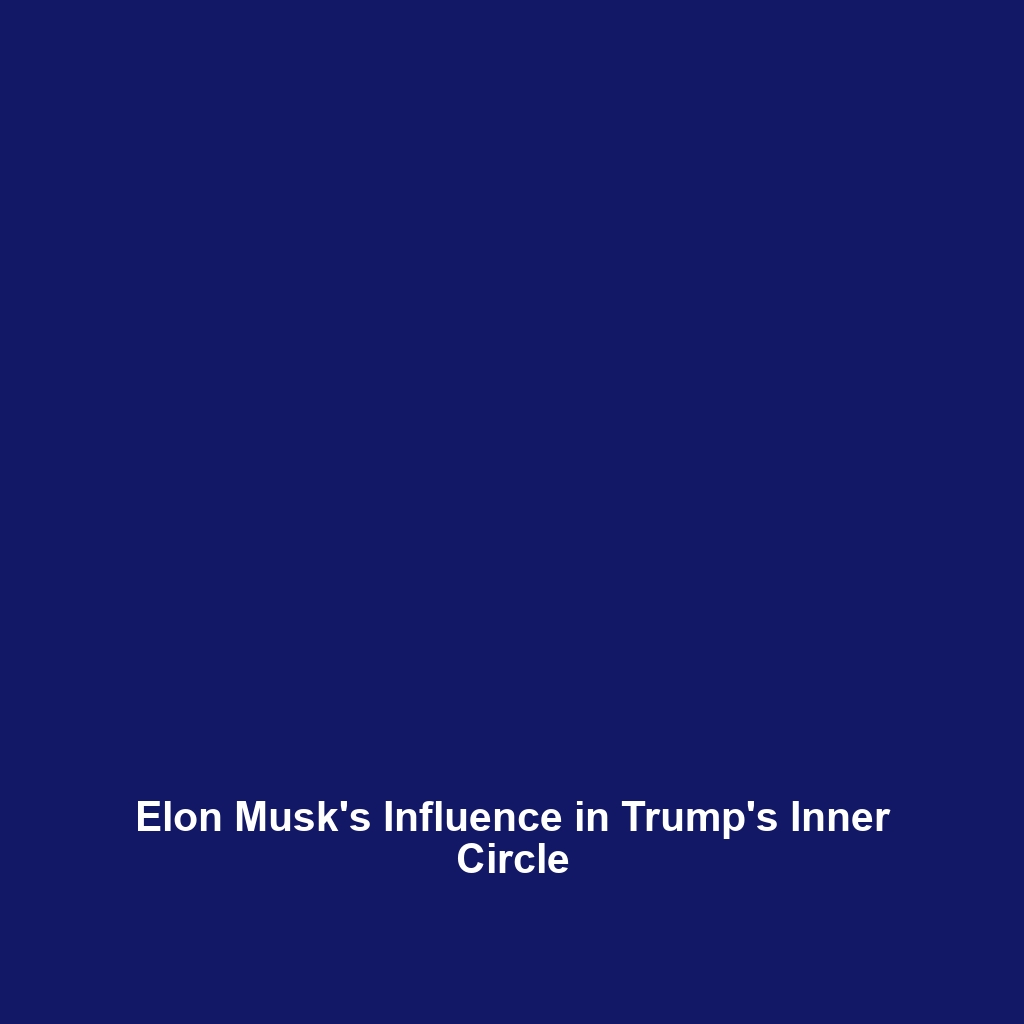
Elon Musk’s Influence in Trump’s Inner Circle
Elon Musk’s Influence in Trump’s Inner Circle
Elon Musk’s Influence in Trump’s Inner Circle
In recent developments within American politics, Elon Musk, the CEO of SpaceX and Tesla, has reportedly become a significant and influential figure in former President Donald Trump’s inner circle. His involvement is believed to encompass key decisions on policy and appointments, shaping the landscape of Trump’s post-presidency agenda and potential future campaigns.
Musk’s Ascendancy in Political Circles
Elon Musk, known for his innovative ventures in technology and space exploration, has increasingly drawn attention for his engagement in political matters. As a billionaire entrepreneur, his wealth and influence afford him access to power corridors, positioning him as an unlikely yet pivotal advisor in Trump’s circle. According to reports from credible news outlets such as The New York Times and The Wall Street Journal, Musk’s relationship with Trump began to strengthen following the latter’s departure from the White House.
Musk, who has maintained a prominent social media presence, often shares insights and opinions that appear to align closely with Trump’s policies, especially regarding technology, energy, and economic initiatives. His platform has expanded significantly since assuming the role of CEO at Twitter, further enhancing his visibility and allowing him to engage with Trump’s supporters directly.
Policy Influence: A Focus on Technology and Energy
One of the critical areas where Musk’s influence is expected to manifest is in the realm of technology and energy policy. Under Trump’s administration, Musk was recognized as a key player in advocating for renewable energy initiatives, despite criticisms surrounding the former president’s overall stance on climate issues. As Trump considers potential policies moving forward, Musk’s expertise in electric vehicles and sustainable technology is likely to guide decisions on infrastructure and job creation in green energy sectors.
Musk’s participation in Trump’s advisory discussions could also influence decisions related to space exploration, particularly with SpaceX’s growing capabilities. Experts believe that Musk’s vision for space could align with Trump’s ambition to revitalize the American space program. Dr. James C. Oberg, a space policy analyst, noted, “Musk’s ability to disrupt the traditional aerospace sector positions him as a credible consultant for reshaping national priorities in space exploration.”
Trump’s Potential Appointments and Musk’s Role
Another area of significant concern is what role Musk may play in future appointments within the Trump administration should he decide to run for office again. With strong ties to influential figures in Silicon Valley and other business leaders, Musk could facilitate the selection of individuals who share similar ideologies and priorities in governance.
Former White House Chief of Staff Mark Meadows commented on this evolving dynamic: “Musk has a unique ability to attract talent. His influence may well extend beyond mere advisory roles and into appointments that can steer policy directions in Trump’s future endeavors.” Such speculation raises questions about the potential synergies between Musk’s private sector experience and Trump’s political strategies.
Criticisms and Challenges Ahead
While Musk’s influence is seen as a potential asset to Trump’s political strategies, it is not without challenges. Critics have raised concerns about the implications of a billionaire’s influence on public policy. Concerns regarding inequality, corporate governance, and accountability in political decisions loom large. Critics argue that the entry of corporate leaders into political spheres could blur the lines between business interests and public good.
Political analyst Sarah L. Anderson emphasized, “Elon Musk’s engagement in politics is a double-edged sword. His ability to push innovative agendas is valuable, but it requires scrutiny to ensure that the public interest is prioritized above profit motives.” This highlights the necessity for transparency in any potential policy discussions orchestrated by Musk within Trump’s circle.
The Future of Musk-Trump Dynamics
As Trump continues to explore his political future, the importance of Musk’s role in shaping policy directions cannot be overstated. Analysts are keenly observing the unfolding relationship, particularly leading into potential 2024 presidential elections. The intersection of technology, economic policy, and political strategy presents a complex landscape that could redefine partisan alignments.
With growing public interest in the back-and-forth between these two powerful figures, further developments are expected. Observers speculate on how Musk might continue to leverage his influence, not only within Trump’s ambitions but across broader Republican strategies that engage values around innovation and growth.
Conclusion
Elon Musk’s increasing presence within Trump’s inner circle is indicative of a rapidly shifting political environment, one where traditional boundaries between business and politics are continuously blurred. As Trump looks to redesign his political playbook, Musk’s role as a top advisor could have lasting implications on critical policies and appointments.
Moving forward, it remains essential for stakeholders and citizens alike to monitor this evolving relationship carefully. The intersection of innovative entrepreneurship and governance raises critical questions about the future trajectory of American politics and policy-making. As the 2024 elections approach, understanding Musk’s influence will be crucial for evaluating both Trump’s strategy and the implications for broader public policy.

Bill Gates Falls in Billionaire Rankings
Bill Gates Falls in Billionaire Rankings
Bill Gates Falls in Billionaire Rankings
In a recent update to the Bloomberg Billionaires Index, Bill Gates has dropped to sixth place as the world’s richest person, a position he has not held since 2017. This change comes amidst a period of rapid technological advancements, particularly within artificial intelligence (AI), which has seen Gates’s wealth diminish relative to competitors in the tech sector, notably Elon Musk and others capitalizing on the AI revolution.
Gates’s Wealth Shift
Bill Gates, co-founder of Microsoft, has witnessed a significant shift in his financial standing. As of early October 2023, Gates’s net worth is estimated at $114 billion, a stark contrast to the approximately $126 billion held by Elon Musk, who has reclaimed the top position in billionaire rankings. The surge in tech stocks, particularly those linked to AI innovations, has propelled competitors ahead of Gates, pushing him down the list.
The emergence of AI as a growth sector has transformed the dynamics of wealth in technology. Companies like OpenAI, founded by Elon Musk and Sam Altman, and others such as Google and Amazon have experienced exponential growth due to their investments in AI technology. This acceleration has left Gates, who has shifted focus to philanthropic efforts through the Bill and Melinda Gates Foundation, at a disadvantage in the competitive landscape of tech billionaires.
The Tech Landscape Shift
The rapid advancements in AI technology are not only reshaping how businesses operate but also influencing the financial trajectories of key figures in the sector. With generative AI gaining popularity, firms specializing in such technologies have seen their valuations soar. Musk’s ventures, including Tesla and SpaceX, have benefited tremendously from this trend. According to an analysis by Forbes, Tesla’s stock price increased by more than 50% over the past six months, attributing much of that growth to the company’s foray into AI-driven applications.
In contrast, Microsoft, under Gates’s original stewardship, has seen fluctuations in its stock price, particularly after announcing layoffs and restructuring within its own divisions. The tech giant has engaged in AI development but faces stiff competition in this newly dynamic field. Experts suggest that Gates’s approach toward AI has not resonated as strongly as those of his competitors, leaving him at a crossroads regarding whether to return to a more direct involvement in tech.
Billionaire Rankings and Economic Indicators
The billionaire rankings serve not only as a measure of personal wealth but also as an indicator of broader economic trends within the tech sector. This recent shift highlights a transformative moment in technology, where innovation drives extreme wealth accumulation with unprecedented speed. A report by PwC indicates that the tech sector’s growth is not likely to slow down anytime soon, particularly in AI and machine learning, reinforcing the need for legacy companies, such as Microsoft, to adapt more rapidly to maintain their competitive edge.
According to Dr. Ayesha Khanna, co-founder of the advisory firm Addo AI, “The future of technology management is not just about software, but about leveraging the latest advancements in AI to solve modern challenges. Companies and individuals who adapt to this shift will thrive.” For Gates, being outside of the top tier of billionaire rankings could signify a need to reassess his current tech engagements and perhaps reconsider a more active role in emerging tech trends.
Philanthropy: A Different Focus
While Gates’s financial decline may be noted in billionaire rankings, it masks his significant influence in philanthropy and public health. The Bill and Melinda Gates Foundation, which focuses on global health issues and poverty alleviation, has contributed billions towards vaccine distribution and education reform, particularly post-pandemic. Gates’s commitment to philanthropy represents a strategic detachment from the fast-paced world of tech competition, which might be at odds with his philanthropic mission.
Gates himself has remarked on the importance of prioritizing global well-being over personal wealth accumulation. In a recent interview, he stated, “Wealth isn’t everything; the impact you create matters more.” This perspective raises questions about whether he will continue to see declines in his financial ranking, or if a renewed focus on technological engagement might drive him back up the list.
Conclusion: The Road Ahead for Gates
The shift in billionaire rankings is reflective of current economic realities defined by technological advancement and innovation. For Bill Gates, the drop to sixth place highlights the rapid pace of change and the intense competition within the technology sector, particularly from AI-driven companies. As he navigates the intersection of philanthropy and technology, it remains to be seen whether Gates will recalibrate his strategy to adapt to the shifting landscape of wealth and influence.
Continued surveillance of the tech sector will be crucial, as the companies associated with AI continue to dominate both headlines and wealth rankings. Gates’s past experience and current endeavors position him to possibly reclaim his stature, but significant shifts in strategy and engagement will be essential to meet the challenges posed by emerging competitors.
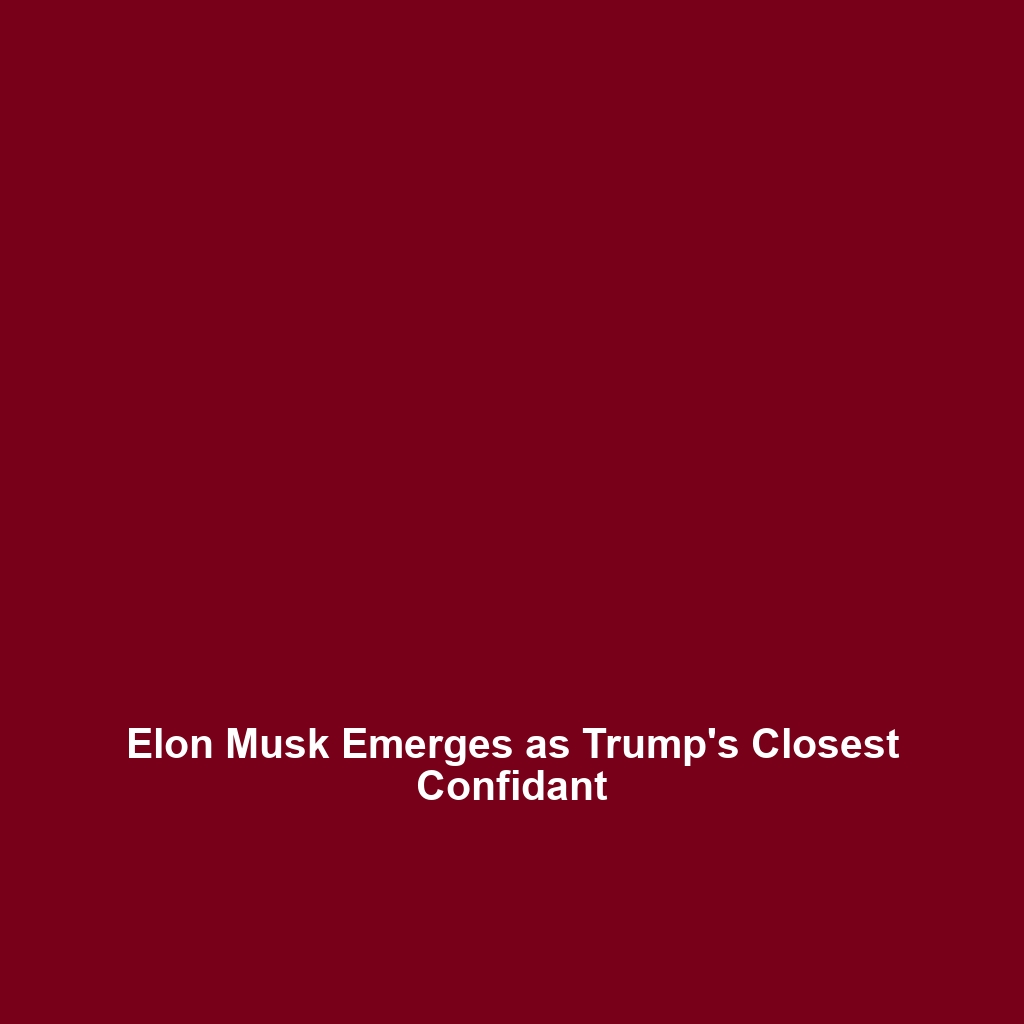
Elon Musk Emerges as Trump’s Closest Confidant
Elon Musk Emerges as Trump’s Closest Confidant
Elon Musk Emerges as Trump’s Closest Confidant
In a surprising turn of events, tech mogul Elon Musk has become a significant advisor to former President Donald Trump, assisting in selecting cabinet members and influencing key policy decisions. This partnership signifies a deepening relationship between Musk and Trump, who has increasingly leveraged the entrepreneur’s influence and resources.
Strengthening Political Ties
Musk’s rise in political advisory roles follows his high-profile presence during Trump’s presidency, particularly in areas concerning technology, energy, and space exploration. His perspective as the CEO of Tesla and SpaceX provides Trump with valuable insights into industries pivotal to the nation’s economic future. According to a source close to the matter, Musk’s engagement in Trump’s inner circle signals a possible shift in political dynamics as both figures share interests in innovation and infrastructure.
Impacts on Policy Decisions
Musk is reportedly advising Trump on several key issues, including energy policy, environmental regulations, and public transportation. His role in renewable energy discourse is particularly relevant, considering his prominence in electric vehicles and solar energy through Tesla’s initiatives. A recent analysis by political commentators highlights that Trump’s cabinet selections may increasingly reflect Musk’s influence, particularly in the Department of Energy and the Environmental Protection Agency.
Experts argue that Musk’s input could reshape the Republican party’s stance on climate change and innovation. David Victor, a senior fellow at the Brookings Institution, noted, “Musk’s advocacy for sustainable technologies could provide Trump with a unique platform to present a more forward-thinking approach to energy policy.”
Musk’s Strategic Positioning
As the face of two multi-billion dollar companies, Musk not only brings entrepreneurial expertise but also a vast network of connections in both the private and public sectors. His relationships extend into the worlds of finance, energy, and technology, providing Trump with an unparalleled resource for navigating complex political landscapes.
Recent reports indicate that Musk has been involved in discussions regarding infrastructure projects, advocating for transportation advancements such as high-speed rail and hyperloop systems. These issues resonate with Trump’s base, which often emphasizes job creation and economic prosperity through infrastructure development. “Musk could be the bridge between technology innovation and political feasibility,” commented Rita McGrath, a professor at Columbia Business School.
Criticism and Controversy
Despite the potential benefits of their collaboration, the relationship has not been without controversy. Critics argue that Musk’s influence could further entrench corporate interests within government policy, a concern expressed by environmental activists and public policy experts alike. “There is a real danger in having someone with Musk’s financial interests bog down government in a technology-centric agenda,” warned environmentalist Anne Hall.
Moreover, Musk’s unpredictable nature and active social media presence raise concerns regarding his public persona and its implications for serious policy discussions. His past statements and tweets have often sparked debate, leading some to question the stability of his advice to a former president. Political journalist Sarah Cooper remarked, “Trump may enjoy Musk’s bold approach, but the potential volatility shadowing Musk’s public image cannot be ignored.”
Future Implications
The evolving relationship between Musk and Trump reflects broader trends in American politics, where celebrity influence is increasingly mirrored in governmental affairs. The impact of this partnership on upcoming elections, particularly the 2024 presidential race, remains to be seen. Should Musk continue to play a pivotal role, it might signal a shift toward a more entrepreneur-driven policy format within the Republican party.
Trump’s favorable views on technology and innovation could also lead to a resurgence of focus on the industries that Musk epitomizes. Analysts suggest that this partnership could enhance the Republican platform, making it attractive to younger, more tech-savvy voters who prioritize climate and innovation.
Conclusion
As Elon Musk ascends to the role of Trump’s closest confidant, the implications for both the individual companies he leads and the broader political spectrum are significant. A potential reshaping of policies surrounding technology, energy, and infrastructure is on the horizon, influenced heavily by Musk’s vision. Observers will be watching closely to see how this alliance unfolds and what it means for the future of American governance and corporate involvement in politics.
For further insights, consider reading “The Power of Influence: Technology and Politics in the 21st Century,” which explores the interplay between business leadership and political strategy.

Arnault’s LVMH Dominance Secures Him Top Spot on Rich List
Arnault’s LVMH Dominance Secures Him Top Spot on Rich List
Arnault’s LVMH Dominance Secures Him Top Spot on Rich List
Bernard Arnault, the French luxury goods mogul and chairman of LVMH Moët Hennessy Louis Vuitton, has surpassed Elon Musk as the world’s richest person, solidifying his position at the top of global wealth rankings. As of October 2023, Arnault’s net worth has soared to an impressive $222 billion, buoyed by the ongoing success and expansion of his luxury empire, LVMH, which controls some of the most recognized brands in fashion, alcohol, and cosmetics.
LVMH’s Market Leadership
LVMH, the world’s largest luxury goods conglomerate, has seen remarkable growth in recent years. The company reported a staggering revenue increase of 20% year-on-year, driven largely by strong sales in Asia and America. Key brands within the LVMH portfolio, including Louis Vuitton, Dior, and Moët & Chandon, have contributed significantly to this profit surge, reflecting consumers’ insatiable demand for luxury goods, even amid a fluctuating global economy.
According to a report by Business of Fashion, Arnault’s strategic focus on expanding the LVMH brand into emerging markets has positioned the company advantageously in the luxury sector. With China returning to growth following its stringent COVID-19 measures, sales in the region have rebounded, resulting in heightened consumer spending on high-end products.
Investor Confidence and Stock Performance
Investor confidence in LVMH has also surged, leading to a 30% rise in the company’s stock this year. Analysts attribute this upward trend partly to Arnault’s adept management and his ability to foresee market shifts. Henri Bénard, a market analyst at Wells Fargo, stated, “Arnault possesses a unique ability to create brands that resonate with consumers. His leadership at LVMH is a key factor in the brand’s resilience and growth.”
Furthermore, the luxury sector as a whole is experiencing a renaissance, with experts predicting continued growth in the coming years. According to Deloitte’s Global Powers of Luxury Goods report, the global luxury market is expected to reach over $350 billion by 2025, highlighting the sector’s robust recovery and expansion.
Competitive Landscape
Arnault’s ascension to the top spot comes at a time when competition within the luxury market is intensifying. Elon Musk, formerly the world’s richest man, has faced challenges with Tesla’s stock performance and has diverted attention toward his ventures in space exploration and artificial intelligence. In contrast, Arnault’s LVMH remains focused on product innovation and brand penetration, allowing the company to maintain a competitive edge.
Rival brands such as Kering, which owns Gucci and Yves Saint Laurent, are also striving to capture market share. Kering’s CEO, François-Henri Pinault, acknowledged the ongoing competition in the sector, stating, “It’s a challenging environment, but we are committed to innovating and enhancing our brand’s appeal.” Nevertheless, LVMH’s diversified portfolio and strong brand equity continue to position it as a market leader.
The Personal Story of Bernard Arnault
Bernard Arnault, born in 1949 in Roubaix, France, transformed his family’s construction business into a luxury powerhouse. He acquired Louis Vuitton in 1987 and merged it with Moët Hennessy, effectively laying the foundation for LVMH. Arnault’s vision encompasses more than just profit; he aims to position LVMH as a cultural institution. His hands-on approach includes overseeing the launch of new products and ensuring that each brand maintains its unique identity.
Arnault’s influence extends beyond just LVMH. He has been an advocate for sustainable practices within the luxury industry, emphasizing the importance of responsible sourcing and production. This shift is increasingly important to consumers, particularly younger generations who prioritize sustainability in their purchasing decisions.
Outlook and Future Considerations
Looking ahead, Arnault’s focus remains on expanding LVMH’s global footprint while navigating potential economic uncertainties. While concerns such as inflation and geopolitical tensions pose risks, the sector’s fundamental strength presents opportunities for continued growth. The company’s robust investment in emerging technologies and digital platforms reflects a commitment to future-proofing its business against market fluctuations.
Industry experts anticipate that Arnault will continue to innovate and adapt to changing consumer preferences, driving LVMH’s success. As the luxury market evolves, Arnault’s leadership and vision will be pivotal in maintaining LVMH’s status as a quintessential brand in the luxury landscape.
Conclusion
Bernard Arnault’s ascent to the top of the world’s rich list underscores the immense potential of the luxury market under his stewardship. As LVMH continues to expand and evolve, Arnault’s multifaceted leadership style and strategic foresight will be crucial for navigating both opportunities and challenges ahead. With a net worth of $222 billion and a diversified portfolio generating consistent revenue, Arnault is not only a symbol of wealth but also of the resilience of the luxury industry in a rapidly changing economic landscape.
